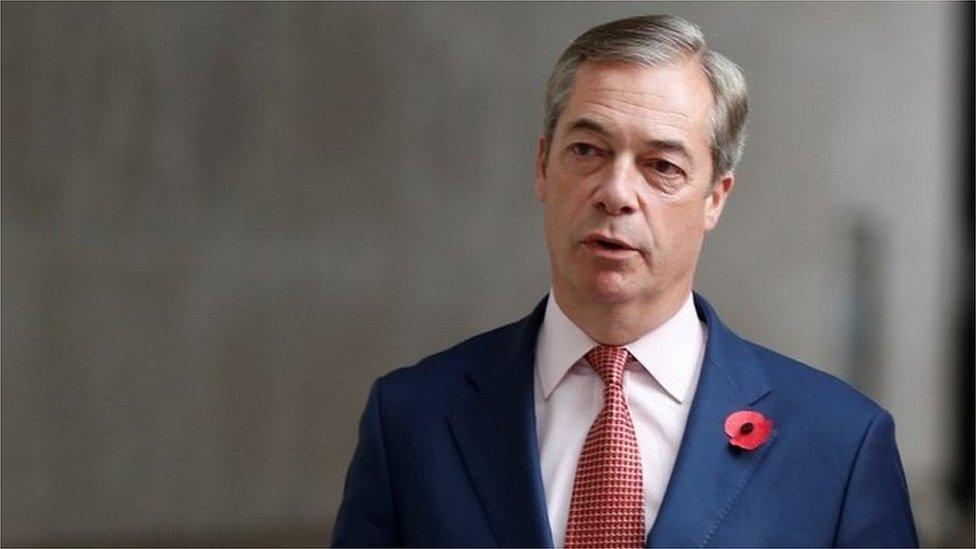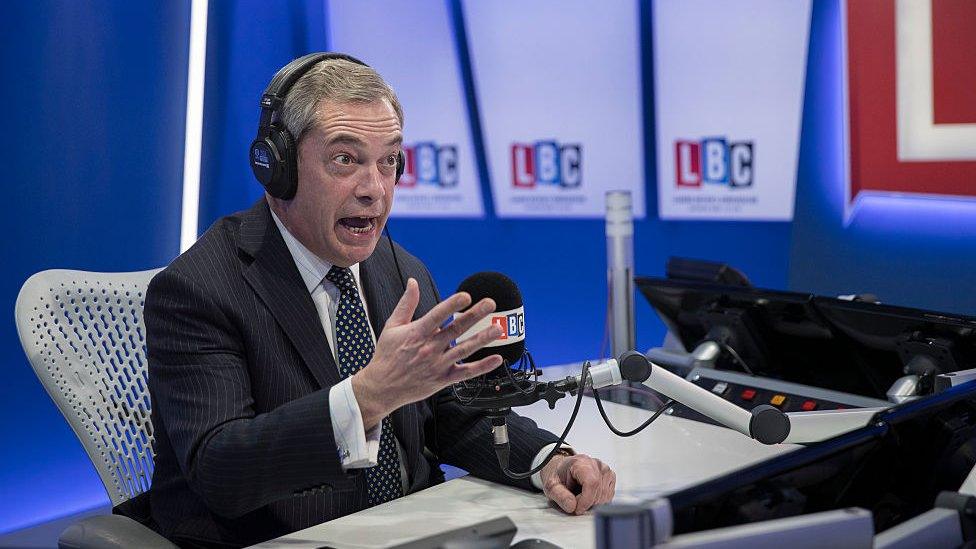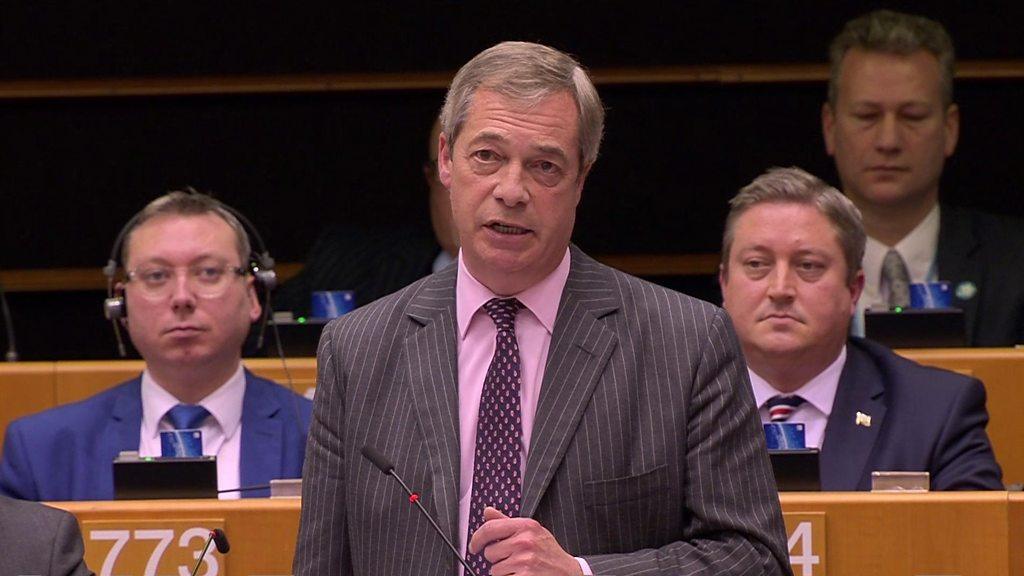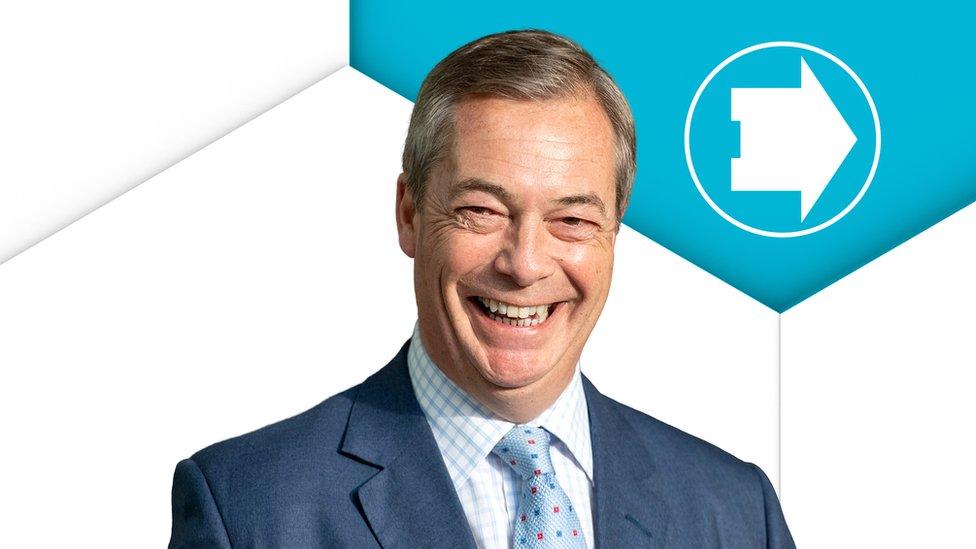Nigel Farage: Brexit Party to focus on fighting lockdown
- Published
- comments

Nigel Farage has applied to change the Brexit Party's name to Reform UK, promising to focus on dealing with the government's "woeful" Covid response.
He said renewed lockdown would "result in more life-years lost than it hopes to save" and argued that "building immunity" would be more effective.
The party leader also said there should be "focused protection" from coronavirus for the vulnerable.
But Boris Johnson will tell MPs later there is "no alternative" to lockdown.
From Thursday, pubs, restaurants, gyms, non-essential shops and places of worship in England will close for four weeks, in an effort to stem the increase in infections.
The House of Commons vote on the measures on Wednesday, with the prime minister outlining his plans to MPs on Monday.
Several Conservatives are expected to oppose the lockdown, including Sir Graham Brady, chairman of the 1922 Committee of backbench MPs, and former cabinet minister Esther McVey.
Labour will back the government, although leader Sir Keir Starmer says it is bringing in the restrictions later than should have been the case.
On Sunday, the UK recorded 23,254 new confirmed cases of coronavirus and 162 deaths within 28 days of a positive test.


This isn't the first time Nigel Farage has raised the idea of rebranding the Brexit Party. Even before the results of last year's general election rolled in, he said his plan was to change its name into - guess what? - the Reform Party. He even claimed to have registered the new title.
The idea was to change politics "for good", campaigning to overhaul the voting system and abolish the House of Lords.
Now it seems Mr Farage is returning to the idea of a re-launch - this time with an anti-lockdown focus.
Perhaps he sensed an opportunity to return to the political debate.
It might cause some nerves in No 10. Mr Farage has posed a threat to mainstream parties - not least the Tories - in the past, espousing populist views which have at times shifted the national debate.
Boris Johnson is attempting to find some middle ground between lockdown advocates and sceptics, with increasing push-back from the latter within his own party.
There is a risk he ends up pleasing neither, and Mr Farage stands poised - as he has before - with an alternative view he'll have no qualms in expressing.

Mr Farage set up the Brexit Party ahead of last year's European Parliament elections, winning 29 seats - the most of any UK party.
In an email to supporters, he and party chairman Richard Tice said this had "rescued Brexit and in so doing, restored some confidence in democracy in the UK".
While they were "keeping a close eye" on Mr Johnson "to make sure he does not sell us down the river" in any trade deal with the EU, they said it was time to "apply our energy and resources to the other pressing issues facing the nation".
They applied last Friday to the Electoral Commission to rename the Brexit Party as Reform UK.
Their email to supporters said: "The government has dug itself into a hole [with coronavirus] and rather than admit its mistakes, it keeps on digging.
"The new national lockdown will result in more life-years lost than it hopes to save, as non-Covid patients with cancer, cardiac, lung and other illnesses have treatments delayed or cancelled again. Suicides are soaring. Businesses and jobs are being destroyed."
Longer lockdown?
Mr Farage and Mr Tice said the UK should follow the Great Barrington Declaration, which calls for "focused protection" for the elderly and other groups particularly vulnerable to Covid-19, while others continue to live relatively normally.
Their email said: "The rest of the population should, with simple hygiene measures and a dose of common sense, get on with life - this way we build immunity in the population. We must learn to live with the virus not hide in fear of it."
Treatments were "getting better" and survival rates were improving, they added.
On Sunday, Cabinet Office minister Michael Gove said the lockdown in England could be extended if it took longer than four weeks to bring the transmission rate of the virus down.
The government has said schools will remain open, with Mr Johnson expected to tell the Commons later that he was "right to try every possible option" - including region-by-region restrictions - before moving on to a national measures.
After an extension to the furlough scheme was announced for England, Scottish First Minister Nicola Sturgeon and Scottish Tory leader Douglas Ross called for similar support to be available if the country needed to go into a full lockdown.
In Wales, First Minister Mark Drakeford has said the 17-day "firebreak" lockdown will end on 9 November, as planned.
Schools in Northern Ireland reopen on Monday after an extended half-term break, while other restrictions including the closure of pubs, bars and restaurants continue until 13 November.
- Published11 June 2020

- Published29 January 2020

- Published22 November 2019
